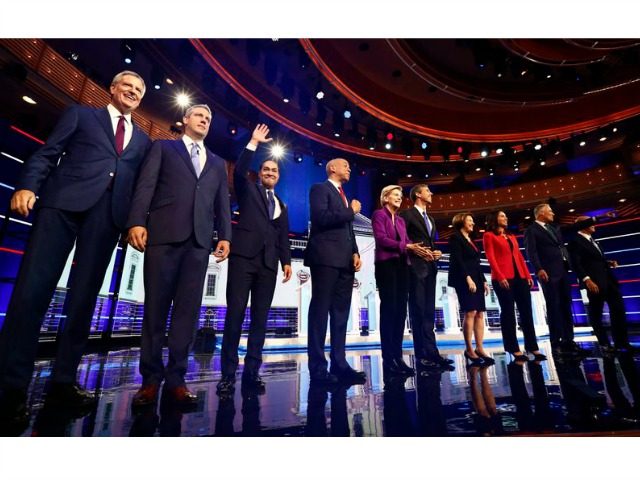The August 28 deadline for 2020 Democrat presidential candidates to qualify for the next debate is rapidly approaching and so far only nine candidates have made the grade.
To qualify, each candidate must reach 130,000 unique donations and also must register at least 2 percent support in four qualifying polls.
The FiveThirtyEight website published its finding on who has already qualified, who is close, and a number of candidates who may no longer have any hope.
According to its tally, the nine candidates who have secured a spot on the debate stage on Sept. 12 and perhaps Sept. 13 in Houston are: Joe Biden, Pete Buttigieg, Kamala Harris, Bernie Sanders, Elizabeth Warren, Cory Booker, Beto O’Rourke, Amy Klobuchar, and Andrew Yang.
“Tom Steyer’s campaign announced Tuesday morning that it had hit the 130,000 donor mark,” the website reported. “He now needs just one qualifying poll to make the third debate.”
Julian Castro is also close to qualifying, just needing a 2 percent ranking in one more poll, FiveThirtyEight reported.
New Age guru and author Marianne Williamson and Washington Governor Jay Inslee have both reportedly surpassed the 100,000 donor mark but need 30,000 more donors to qualify for the debate, and neither has hit 2 percent in any of the approved polls.
For the rest of the candidates, it may be the end of the campaign trail because the don’t have the donors or the poll rankings necessary, including Kirsten Gillibrand, Michael Bennet, Steve Bullock, Bill de Blasio, John Delaney, Seth Moulton, Tim Ryan, John Hickenlooper, and Joe Sestak.
The Democratic National Committee could decide, however, to make it easier to qualify for the fourth debate that will take place sometime in October, according to FiveThirtyEight:
But failing to make the third debate isn’t necessarily all she wrote for some of the lower-tier candidates. According to an email sent by the DNC to the campaigns earlier this month, polls that count toward qualification for the third debate will also count for the fourth debate in October (date still TBD). In theory, that means a candidate who came up short of making the third debate might be able to pick up enough qualifying surveys and donors to make the fourth debate. However, failing to make the third debate might signal to potential supporters and prospective contributors that a candidate isn’t worth backing, thus making it harder to get the polls and donors necessary to qualify for the October event.
No matter, the days of two-night debates with 10 candidates on stage each night is probably now in the history books.
Follow Penny Starr on Twitter

COMMENTS
Please let us know if you're having issues with commenting.